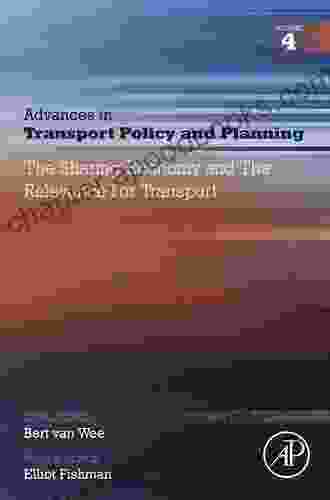The Sharing Economy and its Relevance for Transport: A Comprehensive Analysis

The sharing economy has emerged as a transformative force, reshaping various industries, including transportation. This innovative model, characterized by the temporary access to goods and services through peer-to-peer platforms, has brought about significant shifts in the way people move around.
5 out of 5
| Language | : | English |
| File size | : | 16041 KB |
| Text-to-Speech | : | Enabled |
| Enhanced typesetting | : | Enabled |
| Word Wise | : | Enabled |
| Screen Reader | : | Supported |
| Print length | : | 154 pages |
Opportunities:
- Increased Mobility: The sharing economy has expanded mobility options, especially in underserved areas. Ride-sharing and carsharing services offer convenient and affordable alternatives to traditional car ownership.
- Environmental Sustainability: By promoting shared use of vehicles, the sharing economy reduces the number of cars on the road, leading to reduced emissions and traffic congestion.
- Enhanced Accessibility: Sharing platforms connect people with a wide range of transportation options, empowering those without access to private vehicles or public transit.
Challenges:
- Regulatory Issues: The sharing economy poses challenges to existing regulations designed for traditional ownership models. Governments must address issues such as insurance, licensing, and safety.
- Equity and Inclusion: While the sharing economy offers benefits to many, it may exacerbate existing inequalities if not managed effectively. Access to these services may vary based on factors such as income and location.
- Labor Concerns: The sharing economy has raised concerns about the working conditions of platform workers, including fair wages, benefits, and job security.
Implications for Transport Policy and Urban Planning:
The sharing economy has profound implications for transportation policy and urban planning. Cities must adapt their infrastructure and regulations to accommodate these new mobility patterns. This includes:
- Infrastructure Development: Cities need to provide dedicated lanes, parking spaces, and charging stations for shared vehicles.
- Regulatory Framework: Governments must develop clear and consistent regulations that foster innovation while addressing safety and equity concerns.
- Land Use Planning: Urban planning should consider the impact of the sharing economy on parking demand, traffic patterns, and public transit systems.
Case Studies:
Numerous real-world examples demonstrate the impact of the sharing economy on transportation:
- Uber and Lyft: Ride-sharing services have revolutionized urban mobility, reducing car ownership and providing convenient transportation options.
- Zipcar and Turo: Carsharing platforms have made car access more affordable and flexible, reducing the need for personal vehicles.
- MaaS: Mobility-as-a-Service platforms integrate multiple modes of transportation, including public transit, ride-sharing, and bike-sharing, into a single platform.
:
The sharing economy has significantly transformed the transportation sector, offering both opportunities and challenges. It has increased mobility, promoted sustainability, and enhanced accessibility. However, policymakers and urban planners must address regulatory issues, equity concerns, and labor challenges to fully harness its potential. By embracing innovation and adapting to these new mobility patterns, cities and governments can foster a more sustainable, inclusive, and equitable transportation system for the future.
5 out of 5
| Language | : | English |
| File size | : | 16041 KB |
| Text-to-Speech | : | Enabled |
| Enhanced typesetting | : | Enabled |
| Word Wise | : | Enabled |
| Screen Reader | : | Supported |
| Print length | : | 154 pages |
Do you want to contribute by writing guest posts on this blog?
Please contact us and send us a resume of previous articles that you have written.
 Book
Book Novel
Novel Page
Page Chapter
Chapter Text
Text Story
Story Genre
Genre Reader
Reader Library
Library Paperback
Paperback E-book
E-book Magazine
Magazine Newspaper
Newspaper Paragraph
Paragraph Sentence
Sentence Bookmark
Bookmark Shelf
Shelf Glossary
Glossary Bibliography
Bibliography Foreword
Foreword Preface
Preface Synopsis
Synopsis Annotation
Annotation Footnote
Footnote Manuscript
Manuscript Scroll
Scroll Codex
Codex Tome
Tome Bestseller
Bestseller Classics
Classics Library card
Library card Narrative
Narrative Biography
Biography Autobiography
Autobiography Memoir
Memoir Reference
Reference Encyclopedia
Encyclopedia Lydia Lunch
Lydia Lunch Lisa Yount
Lisa Yount Md Nayeem
Md Nayeem Lisa Frase
Lisa Frase Lilly Mirren
Lilly Mirren Mitsuki Hoshi
Mitsuki Hoshi Marc Schade Poulsen
Marc Schade Poulsen Thomas Benjamin
Thomas Benjamin Lee A Fleisher
Lee A Fleisher M L Martin
M L Martin Loui Lord Nelson
Loui Lord Nelson Linda M Ellis Cummings
Linda M Ellis Cummings Vanessa Siddle Walker
Vanessa Siddle Walker Louis Mckinney
Louis Mckinney Megan Beller
Megan Beller Maria Luis
Maria Luis Lee Jackson
Lee Jackson Stan Brock
Stan Brock Louis Romano
Louis Romano Lyn Hejinian
Lyn Hejinian
Light bulbAdvertise smarter! Our strategic ad space ensures maximum exposure. Reserve your spot today!

 Jesus MitchellEncyclopedia Of Latin American Popular Music: A Comprehensive Guide to the...
Jesus MitchellEncyclopedia Of Latin American Popular Music: A Comprehensive Guide to the...
 Aleksandr PushkinCreating Literacy Instruction For All Students: Unlocking the Keys to...
Aleksandr PushkinCreating Literacy Instruction For All Students: Unlocking the Keys to...
 Philip BellUnleash the Epic Saga of Beowulf: A Literary Masterpiece Reimagined by Todd...
Philip BellUnleash the Epic Saga of Beowulf: A Literary Masterpiece Reimagined by Todd... Lee SimmonsFollow ·19.3k
Lee SimmonsFollow ·19.3k Harvey HughesFollow ·12.2k
Harvey HughesFollow ·12.2k Mario SimmonsFollow ·17.1k
Mario SimmonsFollow ·17.1k Nathaniel PowellFollow ·13.4k
Nathaniel PowellFollow ·13.4k Jules VerneFollow ·12.7k
Jules VerneFollow ·12.7k Harry CookFollow ·10.3k
Harry CookFollow ·10.3k Leslie CarterFollow ·12.5k
Leslie CarterFollow ·12.5k Bruce SnyderFollow ·6.8k
Bruce SnyderFollow ·6.8k

 W.H. Auden
W.H. AudenTerrorist Events Worldwide 2024: A Comprehensive Guide to...
Terrorism is a global threat that affects...

 Carson Blair
Carson BlairBeautifully Uplifting And Enchanting Novel Set In The...
Set in the beautiful West Country, this...

 Jeffrey Cox
Jeffrey CoxAn Utterly Captivating and Uplifting Story of One Woman's...
Immerse yourself in an extraordinary...

 Greg Foster
Greg FosterEngaging the Issues Through the Politics of Compassion
: The Power of...
5 out of 5
| Language | : | English |
| File size | : | 16041 KB |
| Text-to-Speech | : | Enabled |
| Enhanced typesetting | : | Enabled |
| Word Wise | : | Enabled |
| Screen Reader | : | Supported |
| Print length | : | 154 pages |










